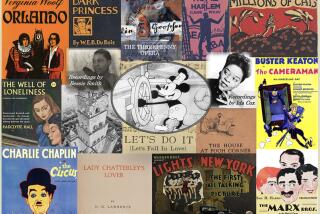Equity for American Artists
When most people think of international trade, intellectual property--those songs, stories and other creations that do not exist merely in material form--has never commanded the attention given to products like cars and computers. But intellectual property is in fact Americaâs second-largest export, generating far more income than what Americans pay for such property from aboard.
Under U.S. law, intellectual property is generally protected by copyright for 75 years or, for works created after Jan. 1, 1978, for the life of the author plus 50 years. When their works are under copyright, authors and their estates gain valuable royalties, but once copyright expires, anyone can use their creative work for free.
Last year, the 15 member nations of the European Union decided to extend their claims to intellectual property to the authorâs life plus 70 years, and Sen. Orrin Hatch (R-Utah) introduced a bill to extend the U.S. copyright by the same period. Hatchâs legislation was expected to sail through Congress, but in recent months an attempt by Sens. Hank Brown (R-Colo.) and Strom Thurmond (R-S.C.) to fly more controversial legislation through Congress on the wings of Hatchâs popular bill has essentially left the Hatch measure grounded in the Senate Judiciary Committee, depriving American artists of the protections enjoyed by their European colleagues.
The Brown/Thurmond bill reduces the income that songwriters would earn from the use of their music by restaurants, bars and religious broadcasters. It has two powerful proponents in the lobbying community: the National Religious Broadcasters and the National Restaurant Assn.
The broadcasters say they should be exempt from the requirement to pay royalties for the music they play on their TV and radio stations because the royalty money goes into a giant pool from which secular artists are paid as well. In other words, they worry that their money will wind up not with wholesome artists like Pat Boone but with âdeviantâ rockers like Nine Inch Nails. This argument, however, is specious, for musiciansâ groups like ASCAP and BMI keep Christian royalties in a specialized pool, as they do for all genres of music.
The restaurateursâ argument is somewhat more credible. While current copyright law exempts small businesses that use a radio or TV set with only a few speakers, the law has been enforced indiscriminately. At a recent hearing, senators heard T. Clark Shaw, the co-owner of a Tennessee restaurant, describe how ASCAP tried to charge him when a 90-year-old woman sang songs from the 1890s long considered works in the public domain. (Shaw fought ASCAP in court and won.)
Hatch has been trying to promote a non-legislative alternative to the Brown/Thurmond bill, a commercial agreement that would exempt approximately 70% of all eating and drinking establishments from the requirement to pay any royalties. The major composersâ groups have agreed to support the agreement, but the National Restaurant Assn. has refused, arguing that the exemption is not broad enough. Music is just background decoration, the association insists, not an element of a businessâ profit picture.
Realizing that a commercial agreement is unlikely, and that the Brown/Thurmond bill stands little chance of enactment (it probably would be vetoed by President Clinton), Hatch has offered a compromise bill. Rather than holding up the passage of Hatchâs original copyright extension bill in order to promote their own, less politically viable bill, Sens. Thurmond and Brown should get behind the compromise bill, which exempts all âsmall commercial establishmentsâ from the obligation to make royalty payments and provides that the U.S. Copyright Office determine that category.
Hatchâs compromise is a sensible alternative to Thurmond/Brown. It ought to be embraced by the Senate so that Hatchâs original bill to match U.S. copyright law standards to European standards can finally move through Congress. That way, Americaâs creative community can receive the same copyright protection that most European artists have come to enjoy.
More to Read
The biggest entertainment stories
Get our big stories about Hollywood, film, television, music, arts, culture and more right in your inbox as soon as they publish.
You may occasionally receive promotional content from the Los Angeles Times.










